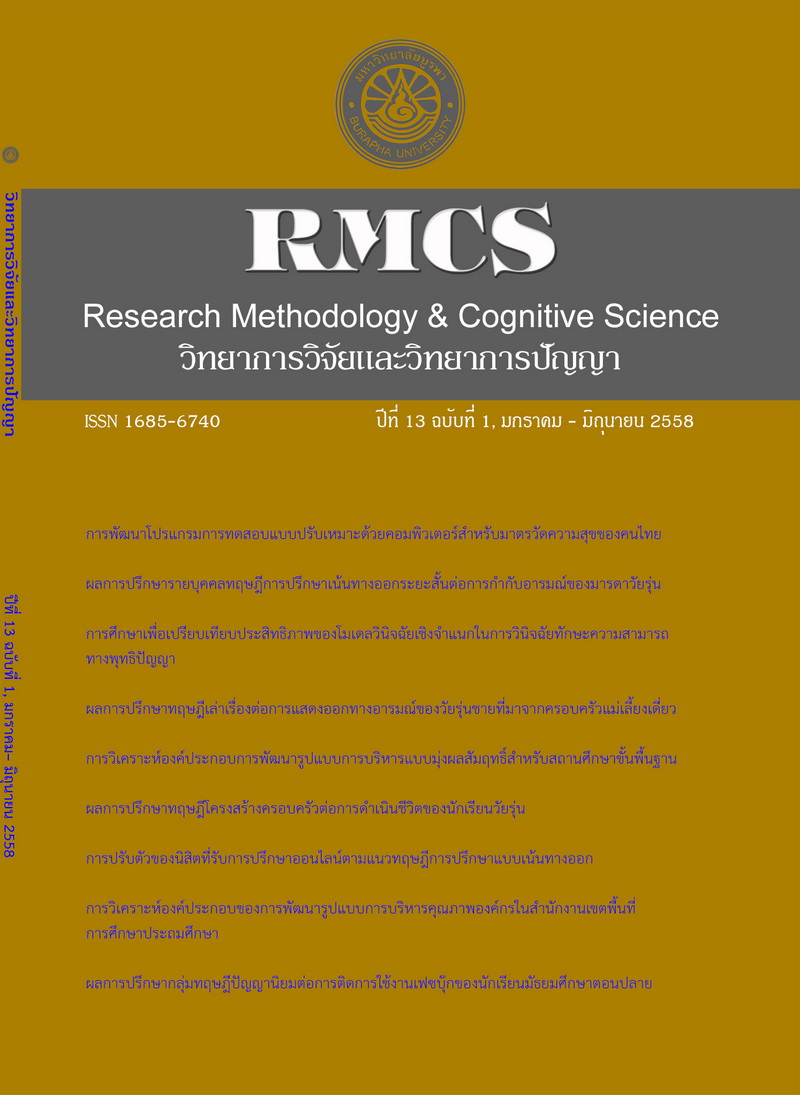ผลการปรึกษาทฤษฎีโครงสร้างครอบครัวต่อการดําเนินชีวิตของนักเรียนวัยรุ่น
Main Article Content
Abstract
การวิจัยนี้เป็นการวิจัยเชิงทดลอง มีวัตถุประสงค์เพื่อศึกษาผลการปรึกษาทฤษฎีโครงสร้างครอบครัวต่อ การดําเนินชีวิตของนักเรียนวัยรุ่น กลุ่มตัวอย่างที่ใช้ในการวิจัยเป็นนักเรียนระดับชั้นมัธยมศึกษาตอนปลายที่มีอายุ ระหว่าง 15-18 ปี โรงเรียนในเขตจังหวัดชลบุรีจํานวน 2 โรงเรียน ที่มีผลคะแนนจากแบบวัดการดําเนินชีวิตที่ ผู้วิจัยสร้างขึ้นตามแนวคิดการดําเนินชีวิตของวอลเตอร์ส ในระดับต่ํากว่าเปอร์เซ็นต์ไทล์ที่ 25 ลงมา และสมัครใจ เข้าร่วมการทดลอง จํานวน 20 คน ดําเนินการสุ่มอย่างง่าย ให้นักเรียนโรงเรียนหนึ่งเป็นกลุ่มทดลอง จํานวน 10 คน และนักเรียนอีกโรงเรียนหนึ่งเป็นกลุ่มควบคุม จํานวน 10 คน เครื่องมือที่ใช้ในการวิจัย ได้แก่ แบบวัด การดําเนินชีวิตของนักเรียนวัยรุ่น และโปรแกรมการปรึกษาทฤษฎีโครงสร้างครอบครัวแบบรายบุคคลที่ ผู้วิจัยพัฒนาขึ้น จํานวน 10 ครั้ง ครั้งละ 45-60 นาที ดําเนินการทดลองสัปดาห์ละ 2 ครั้ง รวมทั้งสิ้น 5 สัปดาห์ โดยใช้แบบแผนการวิจัยเชิงทดลองสองตัวประกอบแบบวัดซ้ําหนึ่งตัวประกอบ แบ่งการทดลองออกเป็น 3 ระยะ คือ ระยะก่อนการทดลอง ระยะหลังการทดลอง และระยะติดตามผลการทดลอง วิเคราะห์ความแปรปรวนแบบ วัดซ้ําประเภทหนึ่งตัวแปรระหว่างกลุ่มและหนึ่งตัวแปรภายในกลุ่ม และทดสอบความแตกต่างรายคู่โดยวิธี บองเฟอโรนี
ผลการวิจัยปรากฏว่า มีปฏิสัมพันธ์ระหว่างวิธีการทดลองกับระยะเวลาอย่างมีนัยสําคัญทางสถิติที่ระดับ .05 นักเรียนวัยรุ่นกลุ่มทดลองมีคะแนนการดําเนินชีวิตของนักเรียนวัยรุ่นสูงกว่านักเรียนวัยรุ่นกลุ่มควบคุมในระยะ หลังการทดลองและระยะติดตามผลอย่างมีนัยสําคัญทางสถิติที่ระดับ .05 และนักเรียนวัยรุ่นกลุ่มทดลองมีคะแนน การดําเนินชีวิตของนักเรียนวัยรุ่นในระยะหลังการทดลองและระยะติดตามผลสูงกว่าระยะก่อนการทดลองอย่างมี นัยสําคัญทางสถิติที่ระดับ .05
The Effects of Structural Family Therapy on Lifestyle of Teenage Students
Nantira Seekhaew and Pennapha Kulnapadol
Faculty of Education, Burapha University, Thailand
This experimental research aimed to study the effects of structural family therapy on lifestyle of teenage students. The samples were 20 high school students from two schools in Chonburi province whose age were between 15-18 year old, those who had lifestyle’s scores less than 25th percentile and volunteered to participate in the study. They were randomly assigned to the experiment and control group, 10 persons in each group. The instruments used in this research consisted of teenage student lifestyle test and structural family therapy counseling program. The experimental group received 10 sessions of counseling for 5 weeks, twice a week, and each session lasted about 45-60 minutes. The study was divided into 3 phases: pre-experiment, post-experiment and follow-up. The data were analyzed by using repeated measures analysis of variance: one between-subjects variable and one within-subjects variable. The Bonferroni’s method was used to test for pair difference.
The results revealed that the interaction between the method and the duration of the experiment was statistically significant at .05 level. The students in experimental group had the lifestyle test scores higher than the control group with statistical significant difference at .05 levels when measured in the post-experiment and follow-up phases. The students in an experimental group had the lifestyle test scores in the post-experiment and follow-up phases higher than the pre-experiment phase with statistical significant difference at .05 levels.

